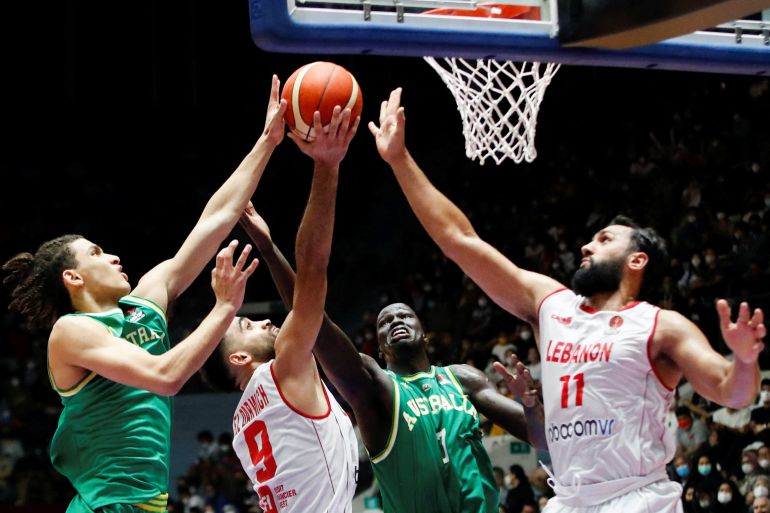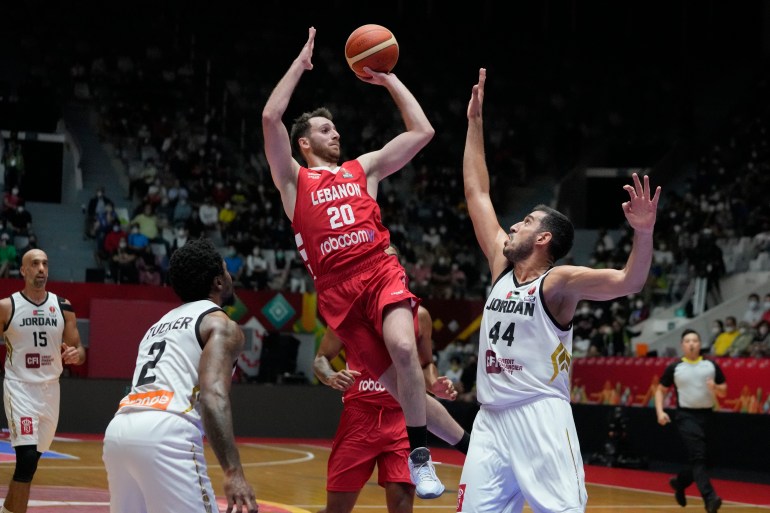Lebanon’s FIBA World Cup journey is about much more than basketball
Basketball fans in crisis-hit Lebanon find much-needed joy and hope through the national team’s journey to this month’s FIBA World Cup.

Beirut, Lebanon – It’s August 2022 and Lebanon are two points up on the Philippines with 18 seconds left in the game at a packed Nouhad Naufal Stadium in a Beirut suburb, when the ball spills out to Wael Arakji on the left – giving him the chance to sink a game-sealing three-pointer.
If the shot goes in, it will not only guarantee the win but will also help secure Lebanon’s ticket to the 2023 FIBA World Cup taking place this August and September.
Keep reading
list of 4 itemsBrittney Griner’s WNBA return puts player salaries back in focus
‘A huge inspiration’: Embiid’s NBA MVP and Cameroon’s hoop dreams
‘One of a kind’: Radhouane Slimane and Tunisia’s basketball boom
Unfazed by the pressure of 8,000 roaring fans and an onrushing Jordan Clarkson looking to block, the 2022 FIBA Asia Cup Most Valuable Player (MVP) makes the shot – effectively guaranteeing the small Arab country its place in the World Cup for the fourth time in its history. Their qualification was confirmed after an easy win against India a few days later.
Fans took to social media after the Philippines game to express their elation.
“I was watching the game while at the office and couldn’t control my screams at every play,” Abed wrote in a Facebook group of 45,000 Lebanese basketball fans. “A lot of coworkers were confused and asked me what I get from all of this. There’s really no explaining our relationship with this sport.”
Responding to Abed’s words, Sleiman takes a stab at the coworkers’ question in the comments: “What do we get from it? Thanks to this game we can experience pride in something called Lebanon rather than in parties, sects or politics.”
Indeed, basketball has brought back much-needed joy, solidarity and hope to a country still ailing from the aftermath of a foiled uprising, the catastrophic Beirut port explosion, and a continuing financial collapse.
Besides qualifying for the World Cup, which starts on Friday, Lebanon also had a magical run to the final of the 2022 FIBA Asia Cup in Indonesia last summer, when they lost by two points to Australia – the third-ranked country in the world.
A few months before that, Lebanon lifted the 2022 Arab Championship trophy in front of a mostly Lebanese crowd in Dubai, mounting a spectacular fourth-quarter comeback to defeat reigning African champions Tunisia in the final.
Experts say these successes have a profound effect on Lebanese society.
“Sports are incredibly powerful because they’re a product that’s full of emotions – it’s a form of entertainment that meshes national identity with personal dreams and passions, regardless of political context,” Nadim Nassif, a scholar of sports history and governance based at Notre Dame University in Lebanon, told Al Jazeera.
“Basketball appeals to the Lebanese because the country is internationally competitive in [one of the] most popular sports in the world.”
‘They can bring some joy’
Basketball has been an outlet for Lebanese society for a few decades now. Benefitting from the large investments of late billionaire Antoine Choueiri, Lebanese basketball quickly flourished after the civil war (1975-1990) and experienced a golden age from the mid-1990s until 2013, when FIBA temporarily suspended the Lebanese Basketball Federation due to governance issues.
Two rival clubs, al-Riyadi and Sagesse, stand out, in particular. Fuelled by sectarian tensions between Riyadi’s mostly Sunni fanbase and Sagesse’s primarily Maronite supporters, the “Beirut Derby” catapulted the sport’s popularity and made the Lebanese Basketball League (LBL) one of the best in Asia.
Although team rosters were always multi-confessional, sectarian parties and their business partners each funded their own teams, allowing them to strengthen their grassroots base while displaying their power by publicly outspending and defeating rivals.
The political funding also elevated the level of competition by professionalising the sport, attracting better foreign players and coaches, and encouraging more young people to seriously pursue a basketball career.
This led to Riyadi and Sagesse winning the Asian championship a combined five times since 1999 and the success also carried over to the national team, which participated in three consecutive World Cups and reached five straight Asian Cup semifinals during that golden age.
Bassel Shibl – a longtime fan, nicknamed “the encyclopaedia of Lebanese basketball” in social media circles told Al Jazeera about how he used to cross the deadly demarcation line separating Muslim-majority West Beirut from Christian-majority East Beirut to watch his favourite team, Riyadi, play friendlies and lift people’s spirits during the civil war.
Bassel also mentioned August 2006, when Lebanon upset Venezuela and former colonial power France at the FIBA World Cup, less than a week after Israel dropped its last bomb in the Israel-Hezbollah War that ended with more than 1,200 deaths.
“We managed to get our first-ever World Cup victories while Israel was constantly air-striking us that summer. Beating France was already massive, but this made the win mean so much more.”
Bassel paused a bit and added: “Now history repeats itself”.
In an emotional post-game interview during the 2022 Asia Cup, MVP of the tournament Arakji spoke of his country’s struggles.
“We come from a broken country full of sadness, so we just want to make our people happy,” he said on July 21.
Arakji then criticised Prime Minister Najib Mikati on social media, after the latter publicly applauded the national team following their victory over China in the Asian Cup quarterfinals:
“We don’t need his congratulations. We’re trying to clean the mess he and his fellow politicians put us in so it would be better if he kept his mouth shut.”

Such public displays of solidarity with the Lebanese people, coupled with the happiness the national team brought in times of crisis, made it clear that the squad’s journey back to the World Cup – after missing the last two editions – is about more than just the game of basketball.
Tammam Jaroudi, the second vice president of the Lebanese Basketball Federation, told Al Jazeera that basketball in Lebanon brings people together across class backgrounds, sects, genders and generations, as well as serving as an escape from day-to-day realities – particularly for the youth.
“Instead of kids being on the streets and going down dark paths, they can have role models like Wael Arakji or Amir Saoud who bring them some joy and make them believe in their dreams,” Jaroudi said.
“Let’s not kid ourselves, we won’t win the World Cup,” he added. “But our goal is to try, as hard as we can, to prove that we belong there by being competitive with the top teams in the world.
‘I’m proud of my country’
Indonesia, the Philippines and Japan will co-host the 19th edition of the men’s basketball World Cup from 25 August to 10 September. Lebanon was drawn into one of the tournament’s toughest groups, alongside title contenders France and Canada, as well as dark horses Latvia – who they face in their opening game in Jakarta on Friday.
But while Lebanon’s chances of advancing past the group stage for the first time are slim, head coach Jad El Hajj said that the team’s ultimate objective is qualifying for next year’s Paris Olympics – a feat never before accomplished by the Lebanese – by finishing as the highest ranked Asian team in the tournament.
Unlike football, where the FIFA World Cup reigns supreme, the Olympics remain the most prestigious competition in international basketball.
If no Asian team wins a game in their respective group – a possible scenario – Lebanon can still reach the Olympics through two classification games that will likely be against Iran and Ivory Coast.
Since they did not participate in the last two World Cups, Lebanon are currently ranked 43rd globally – a long way back from their top 25 FIBA ranking in 2010. The inexperienced squad would have benefitted from preparation games against high-ranked opponents, but the federation could not schedule World Cup preparation games against a top 20-ranked country, although it did secure friendly games against both Iran and Ivory Coast, as well as Cameroon, Egypt and Mexico.
The federation’s most important accomplishment in the run-up, though, was managing to sign and naturalise former NBA player and East Asia Super League (EASL) MVP Omari Spellman, who will be representing Lebanon for the first time this month.
According to FIBA rules, each nation is allowed to give citizenship to one foreign-born player. Coach El Hajj decided to go with Spellman for his size, shooting prowess, and offensive versatility across multiple lineups.
The 12-man roster will also include eight returnees from the 2022 Asia runners-up squad, led by Arakji, co-star Sergio El Darwich, and team captain Ali Haidar. Unfortunately, fan-favourite and potential NBA prospect, 20-year-old Youssef Khayat, withdrew from the tournament after suffering an injury during practice with the Michigan Wolverines, just days before joining the national team in Beirut.
Lebanese basketball has also been affected by the country’s various structural issues. Aside from the state’s bankruptcy – which prevents it from financing the basketball federation – political rivalries and unofficial sectarian quotas continue to undermine the effective governance of the sport. The schedule and format of the 2023-24 LBL season, which typically begins in early October, has not yet been determined because political rivals in the federation are yet again caught in a deadlock – just like Lebanon’s stalled presidential elections.
Nevertheless, even though Lebanon will be huge underdogs when they begin their World Cup campaign on Friday, they have already won the hearts of thousands of devout fans eagerly waiting to cheer them on, as they have throughout Lebanon’s tumultuous past.
Elie, one of Lebanon’s many diasporic supporters, captured this sentiment well while responding online to fans who are concerned about how Lebanon will perform: “Whatever the result, I’m proud of my country.”